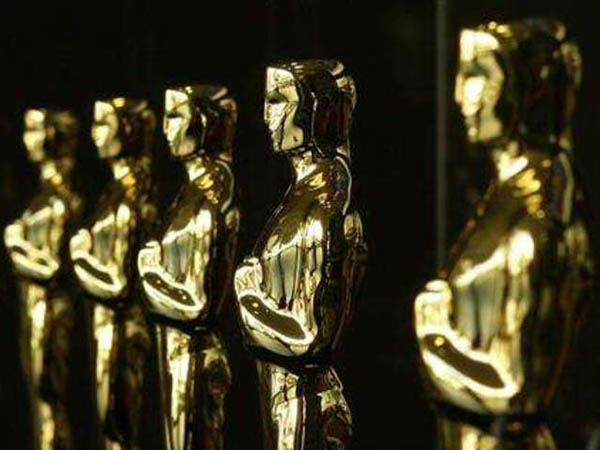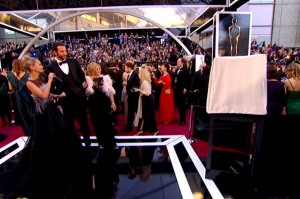“Do you want to be happy? I suspect that you do. Well, here’s the first step to happiness: Don’t get pissed off that people who aren’t you happen to think Paris Hilton is interesting and deserves to be on TV every other day; the fame surrounding Paris Hilton is not a reflection on your life (unless you want it to be). Don’t get pissed off because the Yeah Yeah Yeahs aren’t on the radio enough; you can buy the goddamn record and play “Maps” all goddamn day (if that’s what you want). Don’t get pissed off because people didn’t vote the way you voted; you knew this was a democracy when you agreed to participate, so you knew this was how things might work out. Basically, don’t get pissed off over the fact that the way you feel about culture isn’t some kind of universal consensus. Because if you do, you will end up feeling betrayed. And it will be your own fault. You will feel bad, and you will deserve it.” – “Cultural Betrayal”, Esquire 2005, Chuck Klosterman
Well, the Academy Awards happened on Sunday night (the 24th of February in the Year of Something or Other 2013), ostensibly celebrating the year in movies that was 2012. It was not a clean sweep, something that has become a little rarer in recent years, much like Bengal tigers and Bengals playoff visits. The last time I can think of where one movie solidly dominated the goings-on in Los Angeles was Return of the King in 2003. (Well, 2004, but it was a group of movies that were mostly released widespread in 2003. At least, in theaters in NY and LA near you.) Returning to last Sunday’s evening, we were treated to Daniel Day-Lewis turning into a stand-up comedian, tasteful musical numbers, tasteless musical numbers, show-stopping numbers and numbers that almost literally dragged the bloated carcass that is any awards behemoth into the ground. (Thank you, Les Mis, but it’s impossible for a bunch of mostly talented white people who seem otherwise charming to truly follow the awesomeness that erupted from Jennifer Hudson’s mouth. It’s almost institutionally unfair.)
The big winner of the night (if we have to pick one) was Argo, which followed the trends of most awards groups in Hollywood who voted this year and received Best Picture, as well as Best Adapted Screenplay and Best Editing. In the eyes of the elite of Hollywood, Ben Affleck has finally been redeemed. (Though he was quick enough to castigate Seth MacFarlane for bringing up Gigli. See, Ben, that’s the thing about movies: they’re kind of going to stick around in the $5 Wal-Mart bin forever, and popular culture may forgive you for that particular piece of [art] but they will not forget it. No, sir.)
In reaction to the Oscars’ results, there have been several noted popular and cinematic critics blowing up in outrage over Argo’s victory. This should come as a surprise to no one; ranting about the Oscars is an annual pastime that might be even larger than watching the Oscars in the first place. The battle-cry of those critics voicing their opposition to the movie is that Argo is only mediocre when set up against the massive body of work that was casually dumped into theaters last year, and that it skirts its main issues whilst movies such as Zero Dark Thirty and Django Unchained dive full-bodied into topics that had heretofore been commonly regarded as media taboo.
Well, duh.
To understand why Argo won, it is important to directly confront several myths that are generally held as spoken truths regarding the ceremony of the Academy Awards, who the voters are, and how a movie goes about winning Oscars.
Myth #1: The Oscars are a ceremony that rewards the best and the brightest of the movies released in the previous year.
This myth certainly can stand the test of time: films such as The Godfather, Casablanca, No Country for Old Men, and Schindler’s List are typically regarded as canons of American cinema. (Key word – American. Name me a foreign movie (Britain doesn’t count) that has won Best Picture, and I will eat my shorts.) However, other movies, including several in the Sight and Sound poll deconstructed by Alex and Andrew like Vertigo and Citizen Kane, are Oscar-less. Other deserving entries, such as Crouching Tiger, Hidden Dragon, A Streetcar Named Desire, and Taxi Driver/Raging Bull/Goodfellas all suffer from a lack of recognition. Or, one might think, if we believe…
Myth #2: The annual winner of Best Picture is exactly that: The Best Picture of it’s Calendar Year.
Which everybody and their mother knows is bullshit. As cited in the previous paragraph, Oscar makes mistakes (or public perceptions of mistakes, but we’ll get into that) all the damn time. Sure, there are those who feel that Gladiator, An American in Paris, Rocky, Ordinary People, and Dances with Wolves are monuments to American cinema, and in many cases, they’re correct. (Who can forget the final ballet of Gene Kelly dancing through Paris? Or Mr. R. Balboa running up the steps in Philadelphia? Or Kevin Costner dreaming up the idea that became Waterworld while lying stoned in a fake tipi?) However, the idea that a single collective body of voters can all agree on what they think is the greatest achievement by a single motion picture is patently absurd. Just because one slips through the cracks and receives its due recognition every few years doesn’t mean this is a perfect system.
Myth #3: The Oscars mean something.
Not quite.
I know it might be hearsay to speak this, but the Oscars really are one of the silliest things that we do as humans every year. Seriously, how many people every year do you know who constantly pine about wanting to see all of the nominated movies? And how likely are these people to trek out to see Beasts of the Southern Wild? How often have you made your decisions on which movies to attend because of the Oscars? (If you read the Recorder, chances are that you do, so I might be talking to the wrong crowd, but you get my point. More people saw The Dark Knight Rises in one day in July last year than the total attendance of the entirety of BOTSW’s run. Is that a fair comparison? I don’t know, have YOU seen Beasts of the Southern Wild?
The idea that the winner of Best Picture is something to be hallowed and treasured is an idea that’s been built up a lot over the last thirty years or so, ever since the auteur explosion of the 70’s met the literal explosions of the 80’s and the budget explosions of the 90’s. All of a sudden, the winner of Best Picture stood to receive a hefty box office bump, while simply being nominated could turn a non-profitable indie film into a box office monolith. (Enter Weinstein, Harvey.) In this regard, a Best Picture Oscar does mean something, and that is that the winner will go on to make a gabazillion dollars more than it would without an Oscar. As with so many things in this world, the Oscars are really about a few things: money, power, and entertainment. To say that this means something of great significance, or that art has a place in there (which it should, but doesn’t) is to deny the essential truths laid in front of us. The Oscars are nothing more than a fancy dog-and-pony show, with tuxedos by Armani. (And beards by full-grown badgers, apparently. Hey, George Clooney! Shave!)
But you knew this, already.
Considering that the Oscars are all about money, power, and entertainment, it is important to understand who these uber-successful/uber-powerful people really are.
Myth #4: The Oscars are a fair-minded, entirely objective body of voters who have long, storied careers in the film industry, and are completely balanced in their appreciation of art that advances the medium.
Well, maybe I worded that poorly…
Myth #5: The Academy Awards consist of a voting body more corrupt than the IOC, FIFA, and the NCAA combined, composed of with no moral integrity, no taste or understanding of what art actually is, and an ethical consistency more commonly found in spore mold.
And that might have been a bit harsh.
Myth #6: The Academy Awards voting body is comprised of members who are easily swayed by ritzy advertising, a desire to be part of a movement, as well as longtime industry insiders with agendas and grudges, young eyed innocent filmmakers being exposed to the maelstrom that is the Hollywood awards season, and Jack Nicholson.
That one’s actually true. (Especially the Jack Nicholson part.) Let me boil that down to a simpler statement.
Myth #6: Oscar voters are ordinary schmoes like you and me, with a vested interest in their jobs, careers, and movies. And Jack Nicholson.
To understand what we’re talking about here, let’s go back to 1998, the year of Saving Private Ryan. Directed by one of the most beloved of Hollywood directors, starring one of America’s favorite leading males, and completely changing the way that movies about WWII are to be discussed, produced, and viewed in contemporary society. (I would say ‘changed’, but apart from adding Friday the 13th to Omaha Beach, SPR really is nothing more than an episode of the old TV series “Combat”, and the movies that have followed in its wake include, first and foremost, Pearl Harbor. Which is not to slight the impact of adding Friday the 13th to Omaha Beach, since, you know, that’s what war is like.) At the same time, Miramax Pictures released Shakespeare in Love late in the year, a smartly-written romantic comedy portraying William Shakespeare and other men-in-tights competing for the affections of Gwyneth Paltrow. At first glance, and in retrospective, SPR seems like the obvious winner. Yet Shakespeare in Love won.
Why?
Because Harvey Weinstein campaigned for that movie as though he was in the running for the Republican Presidential Nomination (interchange with Democratic Nominee in 2016 to keep this joke relevant). In addition, Shakespeare in Love fits many tropes that Oscar voters have historically tended to look for; it’s a costume drama, it has a litany of some of the best actors working today (including Ben Affleck! Hmmm…), and a killer script that continues to make English teachers rejoice. (In all honesty, I prefer Shakespeare in Love for several reasons that simply boil down to what I’m more likely to throw in when I’m not in a depressed-mood-that-coincides-with-my-need-to-watch-Vin-Diesel-running-around-in-combat-gear. That particular state of mind seldom happens, by the way.) Consequently, SPR won Spielberg his second Directing award, while Shakespeare in Love won Best Picture.
Flash forward to the modern day. Following his omission from the Best Director category (thanks in part to an unusually early nominating process, as well as the aforementioned stacked pile of quality directors), Affleck apparently went on a humble-brag campaign, stating that it didn’t matter if he was nominated or not, he was simply happy not to be starring in Gigli anymore. That statement could have been 100% honestly true with 0% hidden agendas loaded into its subtext, or it could be part of a scheming Oscar campaign; either way, it worked, as we now see. Affleck’s film went on to win the SAG Ensemble award, the DGA, the PGA, and the WGA, among several other instances of victories. When one movie is steamrolling through awards like that, it generally indicates a consensus among the awards-voting crowd.
And yet, now that the awards have been handed out, the knee-jerk reaction is as though Affleck took Judy Garland’s ruby slippers from their glass case on Oscar night, defecated in them, and then set them on fire while dancing around them with a broomstick.
Which strikes me as patently silly.
Granted, I’ve already admitted that I’m not as invested in the Oscars as I used to be. (My low point was 2001, when The Fellowship of the Ring lost to the slowly fading from view biopic A Beautiful Mind, and I raged and raged for days on end.) In fact, one of the purposes of this website is to allow my co-editors and I a safe place to vent about popular culture. I’ve even written a column entitled the Grudge Report solely to unleash my unbridled anger upon works I deem to be “less than satisfying.” With that being said, an annual venting about the Oscars is growing far too exhausting for me to keep up with. As I’ve discussed, their relevancy as an institution of distinction is somewhat compromised by their inconsistency of choice regarding the landmark establishments of cinema. To take their word as dogma is to ignore the whole purpose of the concept in the first place, which is to highlight and celebrate insightful, entertaining, and quality works of cinema. (This is where the phrase “It’s an honor just to be nominated” should have far more weight than it does in actuality.) What’s more, it is also important to keep in mind that the recipients of Oscars are based upon a majority of votes, meaning that a plurality of those who watched the movie (or at least shared a beer with Ben Affleck) cared enough to vote for one particular movie. That’s how democracy works, and while there might be movies out there that we care passionately about, losing out on an ultimately empty prize is no cause for shame.
Is Argo the best movie of the year? Maybe. Maybe not. The entire notion of there being a Best Picture of the Year is entirely subjective, based upon your viewing preferences. (Although I did write a column dedicated to the subject, so No. No, it is not. With that being said, I did win $10 from a certain co-editor who didn’t feel that it would win Best Picture.) The matter of whether or whether it doesn’t deserve the award is not the point I’m trying to make. It did, and we can all move on with our lives, either ignoring the movie, or watching it religiously every three weeks with a fresh bucket of popcorn. From where the world of Hollywood is currently sitting, that means that they prefer to watch movies that make them feel better about themselves, judging by the trend of Best Pictures over the last three years. (Which is unsurprising, having just come out of one of the darker decades of American history) Should cinema be something more? It should! Should cinema move to entertain us without having to dumb down the stories it tells? It should! Do all movies need to be overly pretentious collections of images and sprawling over-the-top performances that try and ask deep questions while smacking the viewer upside the head with a symbolic phallus? Nope, there’s plenty of room for crowd-pleasing superheroes and giant robots, but those aren’t the movies winning Oscars, either.
Do the Oscars matter? No. Should they?
You tell me.









